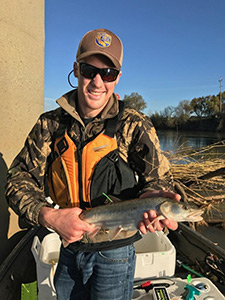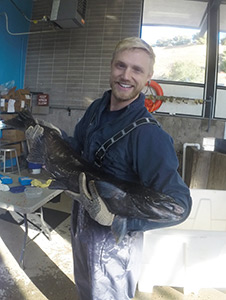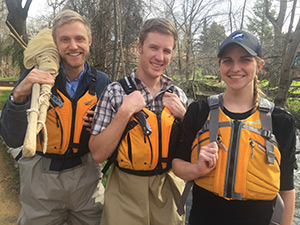Faculty Research
Most BIOL students will learn about faculty research projects as they progress through our curriculum. If you are interested in working intensively with a faculty member and getting course credit for supervised research, you can do this through BIOL 399 or 499. You can’t sign up for these courses in the normal way, but must talk to faculty first and have them agree to sponsor you. Use the links below to explore faculty research topics, and then go talk to a faculty member if you are interested in her/his research program. Usually this happens the semester before you plan to do research. Whether you are successful will depend on your background, the faculty member’s resources, and coordination of your schedules. If the faculty member agrees to take you, you will enroll at the beginning of the semester you start research.
Experiencing research is extremely valuable if you want to see if it is for you, but it’s not an easy way to get units. Although most students do research for 1 or 2U, expect to put in 10-20 hours per week. One semester is the minimum, but the best experiences come from staying for two or more semesters, so you can really get into a project enough to learn about it. We try to have most students present results of their research at a local or national forum, and the crowning achievement is to be a co-author on a professor’s publication.
Use the profile links below to browse research completed by Department of Biological Sciences faculty members.
- Blee, Kristopher (Plant Molecular & Cellular Biology)
- Cline, Troy (Virology)
- Cobián, Gerald (Mycology)
- Engstrom, Tag (Herpetology)
- Fleming-Nuester, Emily (Bacterial Genetics & Physiology)
- Geszvain, Kati(opens in new window) (Bacterial Physiology)
- Gorman, Kristen (Genetics of Scoliosis)
- Hatfield, Colleen (Landscape Ecology & Herbarium Director)
- Ivey, Christopher (Plant Reproductive Strategies)
- Keller, David (Cellular & Molecular aspects of Diabetes)
- Miller, Donald (Animal Behavior)
- Parameshwaran, Kodeeswaran (Neurophysiology & Behavior)
- Wolfe, Gordon (Bioinformatics & Molecular Ecology)
Student Achievements
Congratulations to our Chico State Biology Graduate and Undergrad Students on their amazing achievements!
Ashley Brown, Natural Sciences, Undergraduate presented her research, Exploring the Effects of Proprioception on Idiopathic Scoliosis, at the 37TH ANNUAL STUDENT RESEARCH COMPETITION (Faculty Mentor: Kristen Gorman). Ashley took First Place in the 10-Minute Competition, Session 4.
Molly Tuttle, Biological Sciences, Graduate presented her research, Flattening the Curve: A Covid-19 Wastewater Story at the 37TH ANNUAL STUDENT RESEARCH COMPETITION (Faculty Mentor: Troy Cline). Molly took First Place in the 10-Minute Competition, Session 2.
Stephanie Duarte-Amezcua, Biological Sciences, Undergraduate presented her research, Evidence That the Brain Is Involved in Idiopathic Scoliosis at the 37TH ANNUAL STUDENT RESEARCH COMPETITION (Faculty Mentor: Kristen Gorman). Stephanie took Second Place in the 10-Minute Competition, Session 4.
Karen Contreras, Biochemistry, Undergraduate presented her research, Vertebrae Formation in Medaka fish with Idiopathic Scoliosis at the 37TH ANNUAL STUDENT RESEARCH COMPETITION (Faculty Mentor: Kristen Gorman). Karen took First Place Undergraduate in the 3-Minute Competition.
Shelby Bomke, Biological Sciences, Undergraduate presented her research, The Effects of Static Compression on Scoliosis Osteoblasts at the 37TH ANNUAL STUDENT RESEARCH COMPETITION (Faculty Mentor: Kristen Gorman). Shelby took First Place Graduate in the 3-Minute Competition.

Dylan Stompe was awarded a $12,000 scholarship from the Northern California Water Association that funds his thesis work “Sacramento River predation rates among native and non-native predatory species"

Nick Balfour was awarded a $2,500 scholarship to attend a 5-week summer program at Friday Harbor Laboratories that provides rigorous training in fish swimming physiology and kinematics.

Linda Drobatz (right) received a $1,250 COAST grant (Council on Ocean Affairs Science and Technology) to fund the research she is doing Dr. Amanda Banet's lab.
